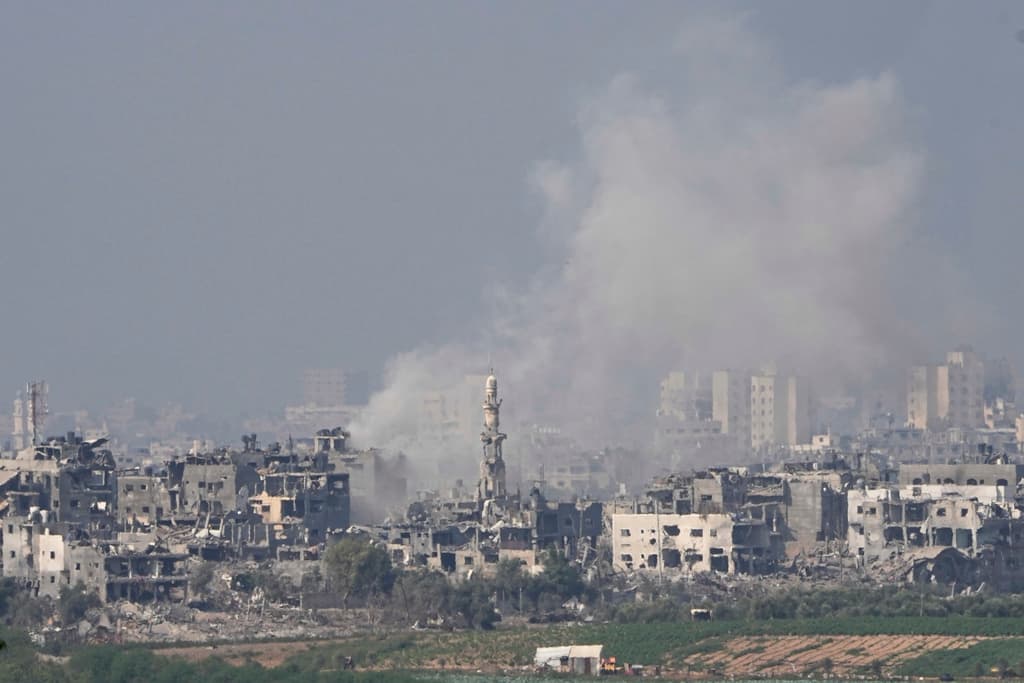‘The Ground Shook in Gaza,’ Israeli Defense Minister Declares, as the War Against Hamas Enters a New Stage
Bombardment by Israel, described by residents of the enemy-controlled territory as the most intense of the war, knocks out communications in the district.

JERUSALEM — The expansion of Israel’s ground operations in Gaza today involves tanks and infantry backed by strikes from the air and sea that caused Israel’s defense minister to declare that “the ground shook in Gaza” and that the war against the territory’s Hamas rulers entered a new stage.
The bombardment, described by Gaza residents as the most intense of the war, also knocked out most communications in the small strip adjacent to southern Israel. This largely cut off the enclave’s 2.3 million people — and their military — from the world during a new stage of fighting.
The grainy images released Saturday are showing tank columns moving slowly in open areas of Gaza, many apparently near the border, and authorities said that warplanes bombed dozens of Hamas tunnels and underground bunkers. The underground sites are a target in Israel’s campaign to crush the territory’s ruling group after its terrorist attacks in southern Israel three weeks ago.
“We moved to the next stage in the war,” the defense minister, Yoav Gallant, said in remarks broadcast Saturday. “Last evening, the ground shook in Gaza. We attacked above ground and underground. … The instructions to the forces are clear. The campaign will continue until further notice.”
His comments signaled the gradual ramping up toward what is expected to evolve into an all-out ground offensive in northern Gaza. Early in the war, Israel had already positioned hundreds of thousands of troops along the border. Until now, troops had conducted brief nightly ground incursions before returning to Israel.
The intensified air and ground campaign raised new questions about dozens of hostages dragged into Gaza by the enemy on October 7. On Saturday, hundreds of relatives of hostages gathered in a square in downtown Tel Aviv, demanding to meet with Prime Minister Netanyahu and Mr. Gallant.
Some in the group demanded that Israel push for the release of all hostages before proceeding with the campaign against Hamas. Protesters wore shirts emblazoned with the faces of their missing relatives under the word “kidnapped” and the words “Bring them back.”
The families “feel like they’re left behind and no one is really caring about them,” said a former lawmaker, Miki Haimovitz, a spokeswoman for the group. “No one is talking to them. No one is explaining what’s going on.” Mr. Gallant later said he would meet with the families Sunday.
In Cairo, President el-Sissi, said his government was working to de-escalate the conflict through its talks with the warring parties to release prisoners and hostages. He didn’t provide further details. The Israeli army spokesman, Rear Admiral Daniel Hagari, said the confirmed number of hostages was 229, after four were released in recent days through mediation by Qatar and Egypt.
He dismissed press reports about a possible cease-fire deal in exchange for the release of hostages, saying Hamas was engaged in a “cynical exploitation” of the anxieties of relatives of hostages. Mr. Gallant said Friday that Israel expects a long and difficult ground offensive into Gaza soon. It “will take a long time” to dismantle Hamas’ vast network of tunnels, he said, adding that he expects a lengthy phase of lower-intensity fighting as Israel destroys “pockets of resistance.”
His comments pointed to a potentially grueling and open-ended new phase of the war after three weeks of relentless bombardment. Israel has said it aims to crush Hamas’ rule in Gaza and its ability to threaten Israel.
Yet how Hamas’ defeat would be measured and what might be the endgame of an invasion remain unclear. Israel says it does not intend to rule the tiny territory but has not said whom it expects to govern the district — even as Mr. Gallant suggested a long-term insurgency could ensue.
At Washington, the Pentagon said Secretary Austin spoke with Mr. Gallant on Friday and “underscored the importance of protecting civilians during the Israel Defense Forces’ operations and focusing on the urgency of humanitarian aid delivery for civilians in Gaza.” The Pentagon said Mr. Austin also brought up “the need for Hamas to release all of the hostages.”
The conflict has threatened to ignite a wider war across the region. Arab nations — including American allies and ones that have reached peace deals or normalized ties with Israel — have raised increasing alarm over a potential ground invasion, likely to bring even higher casualties amid urban fighting.
